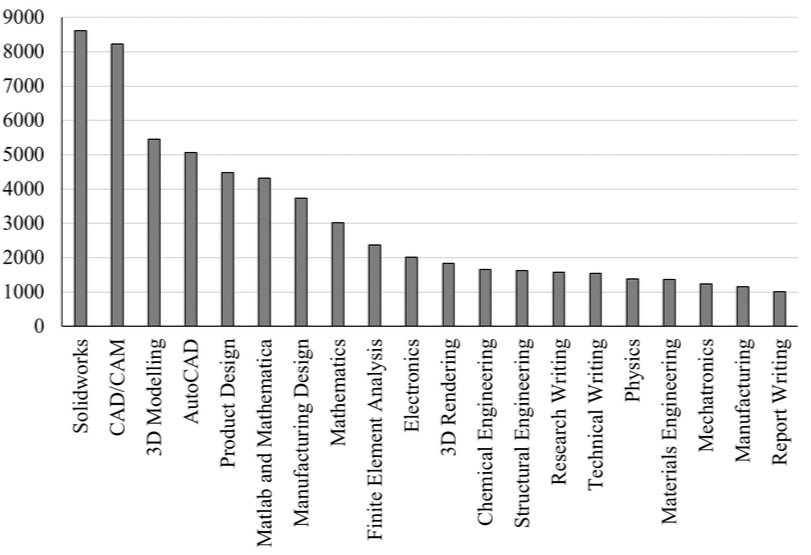You may have questioned where you would apply the skills while attending the practical classes of the UG mechanical engineering programme, since besides opening up a myriad of opportunities and rewards, a BE Mechanical Engineering exposes you to a variety of skills. Also, while the knowledge gained is undoubtedly valuable, the skill set acquired throughout this educational journey holds major significance.
In this blog, we will explore the various skills that are honed during the pursuit of a BE in Mechanical Engineering and how they can positively impact your professional life.
Table of Contents
ToggleWhat is the BE in mechanical engineering
BE Mechanical Engineering is a study area that falls under the purview of designing and manufacturing any product that requires the principles of motion, energy, and force. Additionally, students learn technical problem-solving techniques throughout these academic courses. A few highlights of this course are given below:
Degree Level | Undergraduate |
Duration | 4 years |
Minimum Eligibility | Complete 10+2 with at least 60% in Physics, Chemistry, and Mathematics. |
Subjects Offered | BE mechanical engineering syllabus mostly includes Fluid Dynamics, Theory of Mechanics, Programming Language, etc. |
Necessity of Mechanical Engineering Skills
You can work in many areas as a mechanical engineer, including manufacturing, research, healthcare, and transportation. Therefore, the technical and soft skills for each professional function play a key part in mechanical engineering professions, and given below is an illustration of some of those pertinent skills:

What Skills Can You Acquire Through a BE Mechanical Engineering?
A BE in mechanical engineering places a high emphasis on the skills and information required to strive in the industry. Let us examine the vital skills needed for mechanical engineering placements, as well as those offered by prominent mechanical engineering institutions like Terna Engineering College:
Technical Skills
Technical skills are most commonly associated with mechanical engineering and can be learned through coursework, projects, and internships.
Use Of Lab Equipment
Testing will always be something you do as a mechanical engineer, and therefore you must know how to operate the machinery and what kinds of information can be gathered from it. However, you can gain excellent expertise with lab equipment by participating in an internship for mechanical engineering students, enrolling in a lab course, or working in a professor’s research lab.
Computer Software Skills
The ability to use several computer programmes is essential, and mechanical engineers should be familiar with tools like SOLIDWORKS, Minitab, Excel, etc. Although many businesses also have their systems. But, proving your prowess with various software ensures that you will be able to pick up the new systems swiftly.
Statistics and Data Analysis
This might be one of the important skills required for mechanical engineers because they utilise it frequently. And, if possible, you should enrol in a statistics course to learn how to utilise Minitab, a statistical programme that is employed by a wide range of sectors. Overall, these skills will make you stand out from your peers and look remarkable on your resume.
Technical Writing
Ironically, a lot of people who dislike writing choose to become engineers. But, it turns out that engineers write a lot. In addition, test procedures, technical papers, and lab notebooks are only a few instances of the complex written communication that mechanical engineers in particular need to focus on. Moreover, writing effectively to convey your ideas is a crucial skill in engineering.
Technical Drawings
Undoubtedly, this is one of the crucial skills mechanical engineer should have. A computer-aided design (CAD) course where you learn how to use SOLIDWORKS or another similar programme should therefore be part of your undergraduate degree. Nevertheless, if it doesn’t, make sure to add one to your agenda, as the majority of employers want mechanical engineering majors to have a basic understanding of CAD software.
Soft Skills
Based on sources, 92% of talent experts believe that while making hiring decisions, soft skills are just as important as hard skills. Hence, soft skills, commonly referred to as people skills are specifically needed for career options after BE mechanical engineering.
Time Management
Mechanical Engineers work on a variety of projects at once, all with varying deadlines. So it is important to prioritise your job and manage your time well. However, your busy class schedule can be an assistance to develop a time management strategy that works for you.
Leadership Skills
You might not get a team lead job right after college, but this is one of the best skills to learn for mechanical engineers. Nevertheless, these engineers organise projects, take the reins in meetings, mediate disputes, and assign tasks—all of which are traits of a leader. As a result, while completing your undergraduate mechanical engineering programme, you must concentrate on developing your leadership abilities.
Detail Oriented
You need to pay close attention to every detail to ensure nothing is missed as engineers review a lot of paperwork. Engineers also create test protocols and processes that must be followed by others, and following instructions, while doing lab work and projects can help you get ready for the real world.
Negotiating Skills
Although it is unlikely that this is a need, it is one of the vital future skills for mechanical engineer given how frequently engineers disagree. And, by practising this skill in group projects, you increase your eligibility to apply for higher employment prospects.
Effective Communication
Engineers frequently collaborate with others, therefore you must be able to explain your concepts to both technical and non-technical individuals. To improve this, though, consider explaining some of your projects to non-technical relatives and family or discussing them technically with your classmates.
Decision Making
Decisiveness is listed among the mechanical engineering skills in demand since a mechanical engineer will frequently have to make choices even when the data is not to their liking. With experience, decision-making does grow simpler, and you will feel more secure in your choices.
Wrapping Up
In Terna Engineering College, students who pursue a BE in mechanical engineering gain a broad range of skills that go far beyond the fundamentals. And, the skills you acquire through a BE mechanical engineering will surely aid in your personal and professional growth, regardless of whether you decide to pursue a career in engineering or look into other fields.
FAQs:
Aerospace, Machine Design/Development, Fluid Mechanics, Automation and Control Systems, and Computational Engineering are among the best branches of mechanical engineering.
Yes, a mechanical engineering degree enables you to explore leading to careers in industries like manufacturing, aircraft, machine design, etc. According to projections, mechanical engineering jobs are likely to increase from 9% to 11% by 2026.
Currently, mechanical engineers have a lot of career options because of technical breakthroughs in fields like geomechanics, robotics, smart materials, nanotechnology, computer-aided design, smart machines, etc.
You can look into positions such as Service Engineer, Instructional Designer, Mechanical Designer, Mechanical Engineer, etc. Additionally, the average yearly pay for BE Mechanical Engineering graduates ranges from INR 2.4 to 3 LPA.







